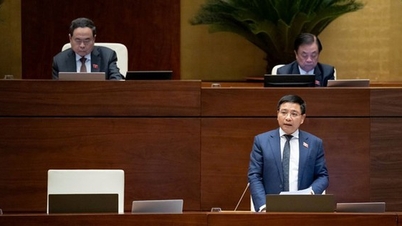
Illustration photo
Regarding the roadmap for building a salary regime for teachers, at Point 5.2, Clause 5 of Conclusion No. 83-KL/TW dated June 21, 2024 on salary reform; adjusting pensions, social insurance benefits, preferential allowances for people with meritorious services and social allowances from July 1, 2024, the Politburo assigned the Central Economic Committee (now the Central Policy and Strategy Committee) to preside over the preliminary review of the implementation of Resolution No. 27-NQ/TW, in which it will coordinate with the Party Committee of the Ministry of Home Affairs (now the Party Committee of the Ministry of Home Affairs) and relevant departments, ministries and branches to study and assess the suitability, feasibility and propose the implementation of 5 new salary tables and 9 new allowance regimes of the public sector accordingly to submit to the Central Committee for consideration after 2026 when the Politburo promulgates and implements the system of Job Position Lists in the political system.
Accordingly, the implementation of the development of a system of legal documents on the new salary regime for cadres, civil servants, public employees in general and public employees in the education sector in particular (taking into account occupations and jobs with higher-than-normal working conditions and preferential policies of the State) is carried out after the Politburo reviews and approves the specific contents of the new salary regime, ensuring compliance with Party regulations, legal regulations and the State's budget capacity.
Regarding the proposal that teachers appointed to the title of professor are subject to the senior expert salary scale, according to the Ministry of Home Affairs, currently, teachers with a salary of a senior lecturer who are appointed to the title of professor are ranked up 1 consecutive level or are given an additional 3 years of seniority allowance beyond the framework for those who are already ranked at the last level. Thus, the salary ranking when appointed as a professor has been implemented higher than in other professions.
The salary table for senior experts in Decree 204/2004/ND-CP dated December 14, 2004 of the Government on salary regime for cadres, civil servants, public employees and armed forces only applies to senior experts according to Regulation No. 180-QD/TW dated July 11, 2024 of the Secretariat on senior experts (senior experts are appointed after the Secretariat agrees to appoint specific personnel) and Decree No. 92/2025/ND-CP dated April 25, 2025 of the Government regulating regimes and policies for senior experts.
Therefore, regarding the proposal that teachers appointed to the title of professor should apply the senior expert salary scale, the Ministry of Home Affairs requests the Ministry of Education and Training to report to the Secretariat in accordance with Regulation No. 180-QD/TW.
The regulation of special salary coefficients for teachers has no political or legal basis.
Regarding the specific salary coefficient for teachers, based on the Party's viewpoints and policies on reforming salary policies in Resolutions and Conclusions (especially Conclusion No. 83-KL/TW dated June 21, 2024 of the Politburo on salary reform; adjusting pensions, social insurance benefits, preferential allowances for meritorious people and social allowances from July 1, 2024), current legal regulations and opinions of the National Assembly Party Committee (on amending and abolishing the financial mechanism and specific income of central state administrative agencies and units), the regulation of a specific salary coefficient for teachers has no political or legal basis.
According to the design principles of the current salary regime, civil servants in all sectors apply a common salary table to facilitate salary arrangement when transferring and rotating in State agencies and units; specific industry policies are implemented through allowance regimes.
Currently, teachers apply the general salary table and salary allowances issued with Decree No. 204/2004/ND-CP, including seniority allowances and preferential allowances for teachers from 25% -70%, so the total salary and salary allowances of teachers are the highest in current career sectors.
At the same time, based on Resolution No. 71NQ/TW dated August 22, 2025 of the Politburo on breakthroughs in education and training development, the Government Party Committee has submitted to the Politburo a Project on salaries and allowances for cadres, civil servants, public employees, and armed forces after the reorganization of the apparatus and organization of 2-level local governments, in which it is proposed to adjust preferential allowances for teachers according to the roadmap. Therefore, the total salary and salary allowances of teachers will continue to increase in the coming time.
For the above reasons, in order to not disrupt the design of the current salary system and create new unreasonable salary and income when comparing with civil servants and public employees in other sectors and professions, it is proposed not to prescribe a specific salary coefficient for teachers because the specific factor of the profession is the preferential allowance for the profession which has been adjusted to increase according to Resolution No. 71-NQ/TW.
Regarding allowances for teachers, according to the Ministry of Home Affairs, currently, allowances are implemented according to the provisions of Decree No. 204/2004/ND-CP and guiding Circulars (including job responsibility allowances and mobility allowances).
Therefore, it is recommended that the Ministry of Education and Training base on the above legal documents to implement the allowance regime for teachers.
In case of adding beneficiaries of allowances, it is recommended to follow the procedures prescribed in the guiding Circulars; at the same time, do not re-prescribe the contents already in other legal documents to avoid duplication (heavy, toxic, and dangerous allowances have been prescribed in Decree No. 113/2015/ND-CP dated November 9, 2015 of the Government on special allowances, preferential allowances, job responsibility allowances, and heavy, toxic, and dangerous allowances for teachers in public vocational education institutions).
Ministry of Education and Training proposes specific salary coefficient from 2026
Previously, the Ministry of Education and Training announced a draft Decree regulating salary and allowance policies for teachers to solicit comments.
One of the notable contents is that all teachers will enjoy a "special salary coefficient".
According to the Ministry of Education and Training, teachers' salaries are currently applied according to Decree 204/2004/ND-CP, classified according to training level. However, only about 1.17% of teachers receive salary type A3 (highest), while in other sectors, about 10% of officials hold senior positions.
Most preschool and primary school teachers are receiving much lower salaries than other civil servants, especially preschool teachers who have the lowest salary scale despite their hard work.
The Ministry of Education and Training believes that salary policy is key to attracting and retaining talented people and improving the quality of education. The Law on Teachers (effective from January 1, 2026) stipulates that teachers' salaries "are ranked highest in the administrative career salary scale system", but to implement it, specific adjustments are needed.
Therefore, the Ministry is advising the Government to issue a new Decree, which stipulates a special salary coefficient: preschool teachers receive 1.25 times, other teaching positions receive 1.15 times the current salary coefficient. Teachers teaching students with disabilities, in border areas, and boarding schools receive an additional 0.05.
The special coefficient is only applied to salaries, not to allowances. The new salary from January 1, 2026 will be calculated according to the formula: Salary = Basic salary x Current salary coefficient x Special coefficient. The Ministry of Education and Training affirmed that although it does not help teachers' salaries to be "highest", this regulation will help salaries to be "higher" than those of civil servants of the same rank, gradually resolving current shortcomings.
Thu Giang
Source: https://baochinhphu.vn/bo-noi-vu-gop-y-ve-de-xuat-chinh-sach-tien-luong-che-do-phu-cap-doi-voi-nha-giao-102251112161934134.htm





![[Photo] Prime Minister Pham Minh Chinh attends a conference to review one year of deploying forces to participate in protecting security and order at the grassroots level.](https://vphoto.vietnam.vn/thumb/1200x675/vietnam/resource/IMAGE/2025/11/12/1762957553775_dsc-2379-jpg.webp)
![[Photo] Highways passing through Dong Nai](https://vphoto.vietnam.vn/thumb/1200x675/vietnam/resource/IMAGE/2025/11/12/1762940149627_ndo_br_1-resize-5756-jpg.webp)

































































































![Dong Nai OCOP transition: [Article 3] Linking tourism with OCOP product consumption](https://vphoto.vietnam.vn/thumb/402x226/vietnam/resource/IMAGE/2025/11/10/1762739199309_1324-2740-7_n-162543_981.jpeg)







Comment (0)